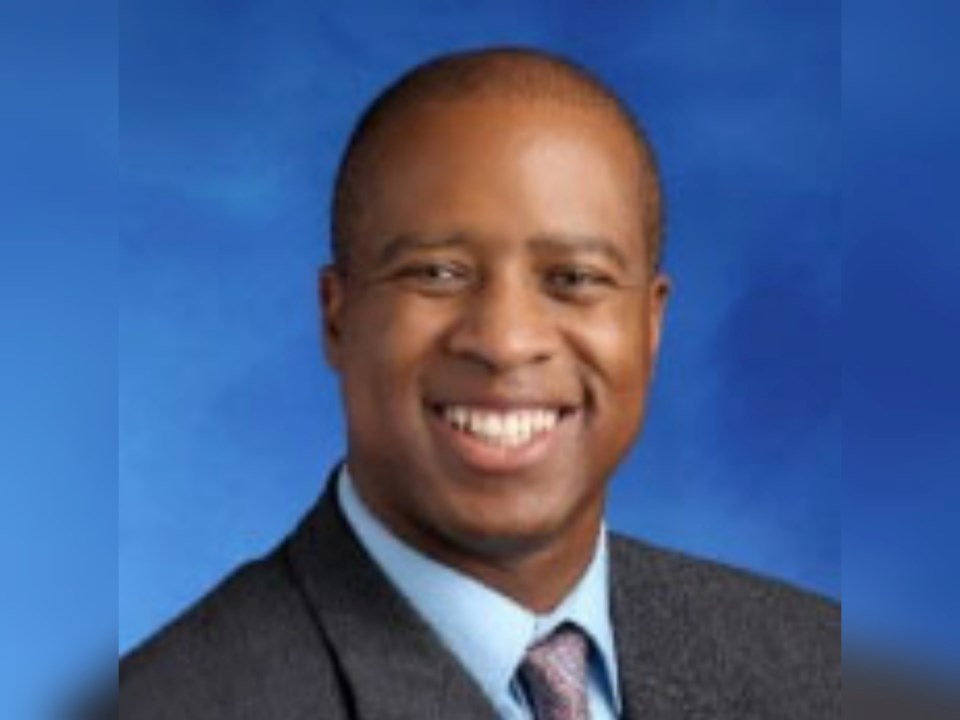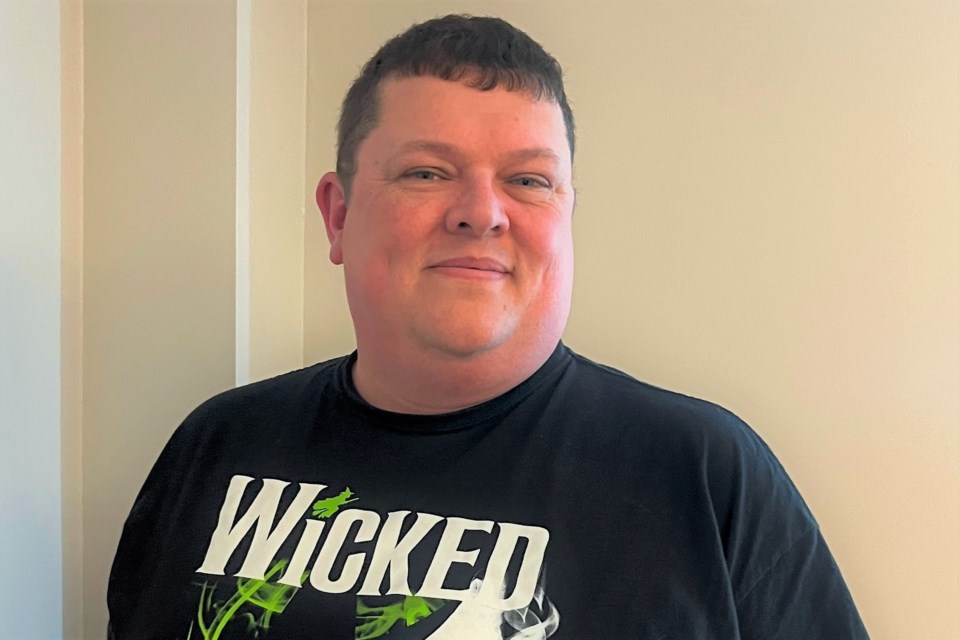Don Latondress starts most days the same way, but usually in a different place.
He gets to a school at about 7:30 a.m., checks his email and calendar, and starts meeting with students shortly after the first bell. In his role as the Simcoe County District School Board’s 2SLGBTQ+ graduation coach – the first-ever established in Canada – Latondress spends his time meeting with students across Simcoe County to provide them with the tools and connections they might need to cross the graduation finish line.
“I hear from students that some of the support is helpful in that I develop strategies (with them). When they’re not doing well with mental health, I help them to develop coping strategies,” he said. “I have helped students with attendance issues. I’m hearing from teachers and administrators that the work I’m doing is having an impact.”
So far, Latondress says he is hearing from students that it is helpful to have someone to talk with who understands their experience. He says he finds helping students plan for post-secondary is a part of his job he finds particularly rewarding.
“We’re building this new way of including people where everyone is valued, heard and respected. It is so important to me,” he said.
‘LGBTQ+ students are struggling in every board’

In February 2021, the Simcoe County District School Board (SCDSB) hired their first Black graduation coaches for Bradford District High School and Nantyr Shore Secondary School, and since that program launched, the board has hired another Black graduation coach to roam schools across the region.
Prior to that decision, the board had also hired Indigenous graduation coaches. While some of the positions were funded by the provincial government, some were not and were funded through the SCDSB’s own budget.
In April 2021, 26,978 students (51%) participated in the first-ever student census undertaken by the public board. The census results are used to aid the board in making intentional efforts to identify and remove barriers that impact equity, achievement, and well-being of students.
Superintendent of Education Matthew Webbe, who also oversees the equity, diversity and inclusion portfolio for the SCDSB, points to 23 per cent of students board-wide identifying as a member of the 2SLGBTQ+ community as part of that census.
“It was telling us something,” said Webbe. “As a person of Afro, Latinx and queer identity – and the first superintendent in our board to be Indigenous and queer – I made a pitch to our senior team that I think we needed to have a graduation coach for (these) students.”
“The data has shown that LGBTQ+ students are struggling in every board. Although we are a small board by population, we’re innovative. We’re hearing from our community, and are responding,” said Webbe.
Growing up gay in North Simcoe in the ’90s
Latondress grew up in North Simcoe. He has degrees from Trent University in psychology and sociology, and a diploma from Humber College in social service work. He has spent his career in Barrie and North Simcoe, working in the mental health and addictions field. He started in his position in June 2022.
“When I saw this position open up at the board, it was really important for me because, going back to my own experience as a high-school student in North Simcoe in the ’90s, there were no caring adults. There were no GSAs (gay-straight alliances),” he said.
Growing up gay in Simcoe County wasn’t always easy for Latondress.
“I had experienced isolation. We live in an area that is primarily rural. We have small pockets with medium-sized communities throughout the county. It’s not easy to build a sense of community,” he said. “There is a high amount of homophobia, biphobia and transphobia that I hear reported from students. They feel that is part of life, which is really disturbing to me.”
“I was lucky that I had a French teacher who became my caring adult and provided the support I needed to graduate high school. Without her, I wouldn’t have done that,” he said.
Latondress tends to work most often out of Barrie, Alliston, Orillia and Collingwood, but works on a rotation where he aims to visit every high school in Simcoe County for a half day every two weeks, and is available upon request in elementary schools. He estimates that he has about 93 students he works with one-on-one regularly with new referrals coming in all the time, but he also works in classrooms and with groups.
Some of the barriers LGBTQ+ students face in reaching graduation Latondress identifies include mental health challenges. He says that members of the community experience higher instances of depression and anxiety and are more prone to substance abuse. Discrimination is also still a major problem.
“I’m surprised at the amount of homophobia that exists in our communities. This is not just in schools. This is in Simcoe County, in general,” he said. “Students tell me about experiences they’ve had in their workplaces, or in their community generally. I was surprised to still hear about the volume.”
As part of his role, Latondress also provides input to the school board’s equity, diversity and inclusion department on board-wide changes that could make a difference for LGBTQ+ students.
One such example is in how physical education courses are structured.
“We’ve been trying to encourage secondary schools to offer gender-inclusive physical education. We’ve heard from students that are transitioning that they might not feel comfortable going into the male phys-ed class anymore, for example, but they can’t go into the female phys-ed,” said Webbe. “There are also students of different religious backgrounds where gender-neutral gym classes could be an inclusive space,” he said. “Simcoe County, in 2023, is changing. This board is growing and changing.”
‘The SCDSB did this first’
When looking back on his own personal experiences, and comparing them to what he sees in his role now, Latondress feels a major shift.
“I’m thrilled to be doing this work. I’m thrilled to see the diversity at the board. I am thrilled with the openness I experience every day in my work, and making positive changes in my community” he said. “Helping people to feel seen, heard, respected and included... I get that every single day.”
“I feel like a valued member of the team. This is not the Simcoe County that I remember from my adolescence. It is so much better and I’m so excited for the work the board is doing,” he said.
Webbe, who came to the SCDSB from a Toronto school board, says in his previous position he experienced anti-Blackness and homophobia.
“I applied on a whim, and ever since I came to this board, I have been honoured for who I am, my academic competencies and professional accomplishments in addition to my heritage. The value this board sees in my intersectionalities... I was shocked how embracing the senior team has been to me,” said Webbe.
“I can go into any school and be who I am authentically. I don’t have to worry about politics. I can be me,” he said.
Webbe says he feels the public board is well-prepared for the diverse growth that is expected to gravitate to the area from the Greater Toronto Area over the next 10 years based on the foundation he has helped to build.
“Migration is heading this way because of cost of living in Toronto, services and affordability,” said Webbe. “I feel honoured to be here. This is a board that is changing with the changing demographics of our kids.”
Latondress also feels proud to work for a board that is blazing a trail.
“The SCDSB did this first. It would have been easy for Toronto, London or Windsor to put these things together, because that community exists. This area still doesn’t have a cohesive community that is strong and vocal in this region. We never have. This board did this because the students identified a need. This role is helpful in bringing people together,” said Latondress.
“For me, as somebody who grew up here and never thought I would see the day when I could be part of this community, I am. For the first time in my life, I feel like I am an important part of the Simcoe County community,” he said.



